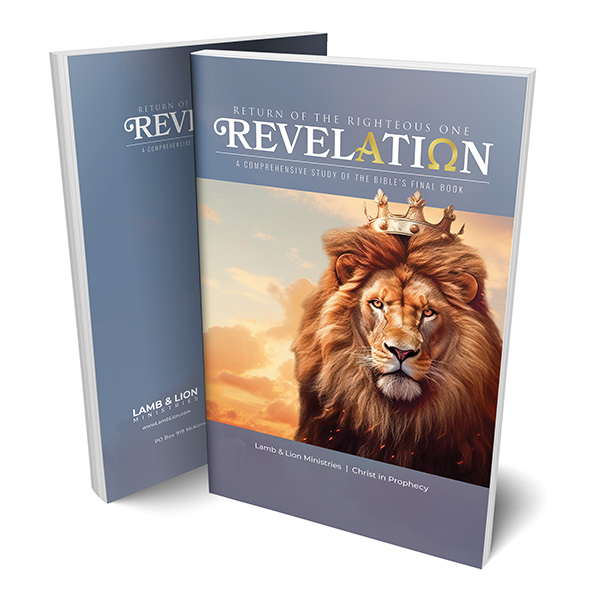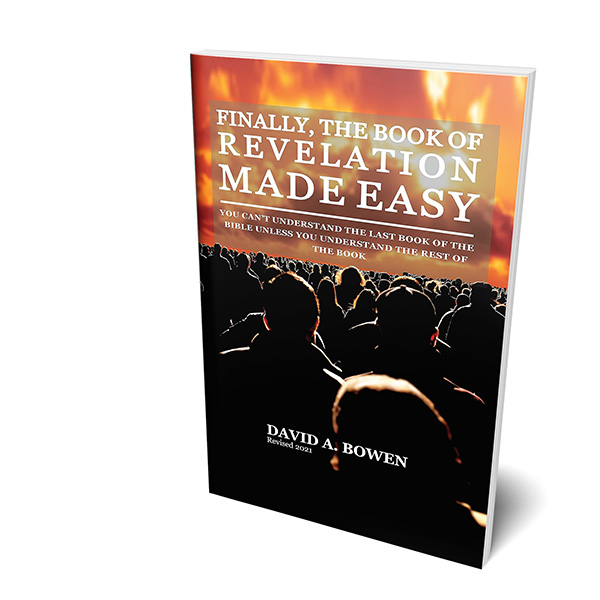What is the hidden code for understanding the book of Revelation? Find out with guest Pastor Robert Morgan along with hosts Tim Moore and Nathan Jones on the television program, Christ in Prophecy!
Air Date: March 16, 2024
Video References
Resources
To continue your study of the book of Revelation, click the buttons below.
Lamplighter Magazine Television Episodes
Revelation Articles Blog Series Mighty Angels Study
To order the resources below, order online or call 1-972-736-3567.
Transcript
Tim Moore: Hello again in the name of Jesus our soon returning King, and welcome to Christ in Prophecy. Over the past 20 plus years, we’ve endeavored to live up to our program title highlighting Jesus Christ in prophecy throughout the Word of God. In 2021 and much of 2022, we worked our way through every book of the Old Testament, highlighting prophecies pointing to Jesus Christ.
Nathan Jones: Well, over the past year, we featured a series on the Feasts of Israel and highlighted the prophetic references to the Messiah and the Kingdom of God they foreshadow. We also completed a six-part series on the signs of the times, exploring various categories of signs Jesus said would proceed His coming. In between, we have highlighted new books and other materials to bless your own study of God’s prophetic Word.
Tim Moore: You know, just recently we took a deep dive into Daniel, a critical book for anyone who wants to understand Bible prophecy. Today we are going to begin a series addressing the final book of the Bible, Jesus’ own revelation of the things which may soon take place. This series will stretch over a period of weeks, we may even intersperse additional shows tied to a particular time of the year or date, but we will move steadily through revelation at a pace that will enlighten, edify, and encourage.
Nathan Jones: No other book of Scripture includes the promise of a blessing for those who read and heed the words of the prophecy. And that promise is so important that Jesus repeats it in Revelation 22:7 with an added blessing on those who heed the prophecies contained in Revelation. Well, how do you heed a book of prophecy? Stay tuned and we’ll provide an answer in just a bit.
Part 1
Tim Moore: Many people are afraid of Revelation, it seems so complicated and mysterious, let alone scary, that even Christians are hesitant to take a deep dive into this apocalyptic book of prophecy. But Jesus did not want to overwhelm us with what He proposed to reveal, so, we are going to approach our study believing that He wants us to understand. I recently found a very good book by a dear friend that emphasizes a straightforward reading of Revelation and offers an easy-to-follow approach to delving its mysteries, “The 50 Final Events in World History.” Thankfully, the author, Pastor Robert Morgan, was gracious enough to join us today. Robert, welcome back to Christ in Prophecy.
Robert Morgan: I’m very happy to be with you. Thank you very much.
Nathan Jones: Well Pastor Morgan, the last time that you joined us, we were going through our Jesus in the Old Testament series and we brought you on to speak about the book of Ecclesiastes and you had the manuscript you were working on for “The 50 Final Events in World History.” Now we actually have the book, wonderful book, we really appreciate it. Back to Ecclesiastes, the author of Ecclesiastes, Solomon said, “Vanity, vanity, everything. is vanity.” And it seems like in our day and age, the culture, society, the leaders, everything is vanity. Can the Book of Revelation give us hope to counter all this vanity?
Robert Morgan: Well, that’s why the Book of Revelation was written. If the Bible had ended with 65 books, the last book would have been Jude. And Jude is a wonderful little book of one chapter. It’s all about defending the faith that was once for all entrusted to the saints, but it doesn’t provide a consummation or a fit ending to the Bible. The book of Revelation does. It’s the 66th and final book of the Bible that brings everything together, gloriously ties together all the strands of everything that comes before it. All of the other 65 books of the Bible lead to Revelation, and all 22 chapters of Revelation lead to Heaven. And it’s a very hopeful book. It is full of glory, full of music, full of hymns, full of angels, full of Jesus. It’s a book that everybody ought to know very well.
Tim Moore: You know, I so appreciate all of your writing, Pastor Morgan. One of the books, or several of the books that have touched my heart most, are your books referring to various hymns from the past and explaining the backstory. They’re wonderful stories of these authors who had lives not unlike ours. They had challenges, sometimes full of joys, sometimes full of tribulation and trial, and yet they were faithful and wrote wonderful songs and hymns. And I appreciate you saying that Revelation has got so many hymns and songs that Christians should study and actually shout out and sing ourselves as praise to our Lord. We don’t have to wait till we get to Heaven to really start singing some of the hymn songs there. But many people will misattribute the book of Revelation as being the revelation of John or the apostle John, or John the divine as some translations say, and yet this is a revelation of none other than Jesus Christ, given to John to record for the sake of all of us to be encouraged and edified.
Robert Morgan: Well, there is a very interesting chain or channel of transmission that is given at the very beginning of the book of Revelation. It says that this material which is revealed was given by God the Father to God the Son. It was given by God the Son to an angel. The angel gave it to John. John gave it to the seven churches. It has come down from them to us, and we’re to pass it on to somebody else. So, no other book in the Bible has that kind of transmission story at the very beginning of it. So, there is a sense, actually, in which every book of the New Testament should be a red letter book by Jesus. He said in His upper room, in John chapter 15 and 16, He said, “I have many more things to say to you, but you’re not ready to receive them yet. But when I get to heaven, I will give them to the Holy Spirit, and He will share them with you.” And so those writings of the New Testament, including Revelation, are actually the words of Jesus that He wanted to continue to give to His Church. And that certainly includes this wonderful book that is the ending, consummating book of the Bible.
Tim Moore: You know, that’s a great insight. And Nathan is quick to tell folks that prophecy in terms of foretelling prophecy makes up between 28 and 32 percent, depending upon whether you count verses or chapters or words. But I have made the point for the last year or two that prophecy really makes up 100 percent of the Bible because that which is not foretold is forthtold, and well over a thousand times in Scripture, the prophets and the writers say, “Thus sayeth the Lord.” But really, it’s all His revelation given to writers, given to prophets for our edification and for our blessing.
Robert Morgan: All of Scripture, it says, is inspired or breathed out by God, in 2 Timothy 3:16. And that is such an encouraging verse because that means we can have absolute confidence in every verse. It’s inspired. The Bible is infallible and inerrant. We can trust it. And that gives me a lot of confidence. Every time I open this book, it’s different from any other book that I’ve ever opened in that way. It’s got a dual authorship. Every word comes from a human being, but every word also comes from the breathing out of God’s word into them so they could write it down infallibly.
Tim Moore: Amen.
Nathan Jones: Well, Pastor Morgan, what was the context of the book of Revelation? John is very old right now. Christianity is very persecuted. Where was John when he was asked to write this?
Robert Morgan: John was the bishop of Ephesus; we know that from very reliable sources in Christian history. He was exiled by the Romans. I mean, he was the last surviving apostle. So, his voice was distinct from every other Christian voice in the world at that time. He was the old man, the last one, and the Romans just felt they couldn’t afford for his voice to continue to be heard. And so they didn’t want to kill him, that would have made him a martyr. So they wanted to exile him to the Island of Patmos off the coast of modern-day Turkey. And they didn’t realize they were simply sending him on a little vacation during which God would give him the greatest revelation ever was in order to complete the Bible. You know, the Devil thinks he’s attacking us, but the Lord somehow has a way of turning curses into blessings. So, John received this information on the Island of Patmos. He wrote it down and sent it to the seven primary churches in his area of ministry, which was around the city of Ephesus and the surrounding area, which today is in western Turkey, we would call that area the western coast of Turkey.
Tim Moore: Yes, sir. One of the things that is so encouraging to me is that John so faithfully recorded what Jesus told him to write. There’s only a couple of instances where he was told, do not write this. For instance, in chapter 10, verse four, when the seven thunders make appeal, he is told not to write that down because it’s not yet for everyone in the world to understand or to know. And I’m okay with that, there are things in the mind of God that I couldn’t possibly comprehend or contain. And yet John also records the words of Jesus in chapter 1, verse 19, that gives us sort of the table of contents for the entire book, the things which he had seen, the things which are, and the things which will happen after these things. Tell us a little bit about this table of contents and then how you developed your view of Revelation, and I’m going to even borrow the book here as you go back and forth from heaven to earth in explaining what John is recording.
Robert Morgan: Yes, that verse in chapter one I think is, and most commentators that I’ve read say it’s a real key to understanding the book. Write down three things. Number one, what you have seen, referring to the great vision of the glorified Jesus in chapter 1 that opens the book. The things which are now, which is chapters 2 and 3, the current state of the church on this planet. And the things that will be, so that’s chapter 4 through 22. So, the future prophetic portion of Revelation runs from chapter 4 to chapter number 22.
Now what I observed that I’ve never seen before until I was reading and studying it in preparation for this book, is that the viewpoint shifts all the way through the book from earth to heaven. So, it will say, “On earth, all of these things, certain things happen.” And then in heaven, here’s how they’re reacting. On earth, here is another disaster that occurs, and heaven, here’s how they are responding. And that back and forth between earth and heaven goes literally all the way through the book. It’s very interesting, which tells us that Revelation is heaven’s commentary on the events that are happening on earth during the last seven years of world history before Jesus comes again. So, the prophetic portion that goes from chapter 4 through 22 includes everything that will happen after the beginning of the Tribulation Period.
And as you indicated, one of the things that I’ve determined, and this is after many, many, many years of studying, is that those events are sequential, in my opinion. So, one happens after the other. So, you have seven seals that are broken, representing seven disasters on the earth. Then you have seven trumpets that are blown, representing seven more disasters. Then you have seven bowls of wrath that are poured out, representing seven more disasters. And I think one of those happens, one after the other, sequentially, chronologically, which makes this book very easy to follow.
Tim Moore: I also like the fact that you pull out, and Nathan, I’ll, turn back to you, but you pull out the verse in chapter one, which says that Jesus gave this vision and this revelation to John to show his servants what must soon take place. And you emphasize the word must. This must soon take place. It’s not a maybe. It’s not, well, we’ll see what happens. It must take place because God has declared it, which is why sometimes John and other prophetic writers use the past tense to describe future events, at least in human history, because once God has declared something will happen, it’s as good as has happened. And yet, even as sometimes we think, “Oh, that’s terrible, that’s tragic,” from the perspective of Heaven, it is always praiseworthy because God is worthy to be praised and He is righteous in all His judgments. And so He is due our praise whether we’re on the earth or in heaven.
Robert Morgan: Yeah, well I would just say that the disasters on earth provoke praise in heaven because evil is being judged. It’s not because God is somehow delighting that there are disasters on earth. It’s that there is evil on this planet that has been growing through all of the years, and finally the time has come to judge the evil, to vindicate those who are suffering, and to make things right the way that they should be and to hasten the return of Christ. So that’s why there is rejoicing in heaven as you see these various events take place on earth.
Nathan Jones: Well, in chapter one of your book you call it the hidden code for understanding Revelation. Would you want to give us some insight into that, is that what you just explained? Is the hidden code to understanding it?
Robert Morgan: I think so, because you have events on earth, commentary in heaven, and I say that it’s like watching a football game or listening to one on the radio. You know, you have the play-by-play saying, “Long pass down the field to the five, to the four, to the three, touched down.” And then you have the color commentator who will explain, you know, sort of take you behind the scenes and show you how the play unfolded and everything like that. So, you have the play-by-play on earth, but then you have the color commentary from heaven explaining what it means, and why heaven is responding the way that they do, and it goes back and forth.
And there is a lesson in this, Nathan, we always need to look at the circumstances on earth from the viewpoint of heaven. Wisdom is looking at life from God’s point of view. And even the things that happen to us, you know, if I have a, like I was telling you off air that I was stranded in Dallas during a snowstorm. Well, I have to say, you know, on a human side, this is frustrating, but God must have some reason for this. There is something here that I don’t know. And we say, “Lord, you know, I trust you.” And then I began to say, “Well, this has given me some time for this.” And I was with my grandson, it gave us time for that. And we began looking at things more the way the Lord does. So, you know, the Bible says in Isaiah 55, “My ways are not your ways, my thoughts are not your thoughts. As the heavens are higher than the earth, so my ways are higher than your ways, and my thoughts than your thoughts.” So, looking at Revelation and seeing how heaven looks down on the events of earth gives us a lesson about how in our own lives we should not just react to the things that happen to us, but pause and say “Lord how are you using this? What do you intend? How do you see this? And He always looks at things differently and more optimistically and more hopefully than we do.
Tim Moore: I recently saw a challenging post even on social media, somebody had written, you know, instead of asking, why is this happening to me? Or why me, Lord? The more appropriate question is, Lord, what can I learn from this situation? Or how can I testify to your faithfulness in spite of whatever my circumstances are? And it really shifts the perspective into being resonant with what God would teach us and what He would have us to learn, and how He would have us to grow in our faith, regardless of our circumstances. I think that’s a way to even look at these letters to the churches. Obviously, I believe that there were seven literal churches, the letters were intended for them, but there are great truths even within these seven letters that we can apply not just to our churches, not just to the historic church age, but to each one of us. And so, you list a number of faults that we should try to avoid, and another of qualities that we should emulate or we should use as examples for how we can aspire to grow in our own faith.
Robert Morgan: Yes, so chapter one is that introductory chapter of Revelation. Chapters two and three are miniature epistles or messages to the seven churches to which this material was originally intended. And of course, the reason is, if the Lord is going to give the final bit of His information to humanity by entrusting it to seven churches, He wants those churches to be as healthy as they possibly can. And so, he did a diagnostic on all seven churches, and he said here’s where you are strong, here’s where you need to improve. And it’s like seven mirrors that we can look in because those churches are not that much different than our churches today. And the members in those churches are no different really than the members of our churches today. So, as we study those seven little paragraphs in chapters 2 and 3, we see ourselves there. And we say, “Well, God is giving me this information as well, just as He gave it to those churches. He wants me to be as healthy a recipient as I can be.” So those are very important chapters. We don’t skip them because chapter 1 is introduction, chapters 2 and 3 are an examination, in which we can say, well, here’s where I need to be stronger so that I can then be entrusted with chapters 4 through 22.
Nathan Jones: It’s interesting that when Christians look at Jesus generally, they think of the Christmas Jesus. He’s the baby. He’s helpless. He needs to be taken care of, and that’s the Jesus that they think of. And then it comes to Easter, and He’s the bloody and beaten man who’s on the cross, and at least for Catholics, He seems to stay on the cross, until it gets to be Christmas again and He’s back to the baby Jesus. But what blows my mind is in chapter one, we’re introduced to the prophetic Jesus, verse 13, “One like the son of man, He’s clothed with a garment down to the feet. He’s girded about the chest with a golden band. His head and hair were white like white as white as wool.” And that sounds very human. But then we get His eye like a flame of fire, His feet like fine brass as a refined furnace, His voice like the sound of many waters. And it says here that He holds in his right hand seven stars. So there’s a mystery to Him which He then explains later in 12 and 13. “The seven stars which you saw in my right hand and the seven golden lampstands, the seven stars are the angels of the seven churches and the seven lampstands which you saw are the seven churches. Do you see it as greatly hopeful that the Lord isn’t out there somewhere distant, but He holds all the churches in His hands. He holds our churches in His hands. He holds us in His hands.
Robert Morgan: I think, Nathan, that the picture we have of Jesus in chapter one is more or less literal. I think, you know, when it says that His hair was white, it’s not because He was old, it’s because like on the Mount of Transfiguration, the light just emanates from Him. And something can be both literal and symbolic, you know, or it can be literal and have symbolic trappings around it. For example, we say that, you know, it may say we may listen on the news and it says the White House announced today. Well, the White House is a literal building, but it doesn’t really talk, you know. It’s a literal building, but there’s also a symbolic element there that it symbolizes the presidency, and the president who then will make an announcement. So I think it’s a mistake to say, well, this is totally literal or this is totally symbolic. I think there is an overlapping. And this picture of Jesus I think in chapter one is the closest biblical description we have to what we will see when we get to Glory that we have in the Bible. But there are obviously some trappings of symbolism such as the seven stars representing the seven churches that He is holding. And then later, He’s walking among the seven lampstands which represent those seven churches, which really represent all of our churches indicating that even though He’s up on the throne, there is a sense in which He is among us right now and we know that from our theology to be by the Holy Spirit.
Tim Moore: I think one of the things that you make very clear in your book, and you do harken to many of the symbols in Revelation, some of which are described and explained within the book itself. But in order to study Revelation, you must be a student of the rest of God’s Word, because so many of the symbols, even so many of the references that John uses to describe come from Old Testament and sometimes New Testament writings that He uses because He’s seeing the same thing. For instance, Isaiah saw, unlike Isaiah who said, “Woe, it’s me,” John already having put faith in Christ, doesn’t express any woe when he gets to heaven,” in chapter 4, but he uses many of those symbols. Pastor, one of the things that we find so encouraging about the appeal to Revelation is twice over, it offers a blessing for those who read or hear and heed the words of this prophecy. So, I can understand how to read, I can understand how to hear, if it’s presented to me audio, how do I heed a book of prophecy?
Robert Morgan: Well, there’s a couple of ways. One is that when you read through Revelation, you see the importance of holiness, and righteousness, and living in a way that is different from the world around us, because the world is getting worse and worse. And what we see, especially in chapters 4 through 18, which is the story of the Tribulation, the seven years of Tribulation, is a world that is dominated by increasing evil. And we go through and say, well, to be a child of God in an evil age is a very wonderful thing. It may be threatening, it may be dangerous. It is not safe to be a Christian, but it’s a wonderful thing. And so, we learn aspects of holiness, and spiritual maturity, and response, and growth as we read through the book.
But the other thing is that it gives us what psychologists call future therapy. People need a healthy psychology to live by. And a healthy psychology always has anticipation, which we call in biblical terms, hope, and I almost hesitate to use the word hope, even though it’s a biblical term, because in our vernacular, and even in Bible times, the concept of hope could mean something that might or might not happen. You know, I hope it won’t rain next week on our picnic. But, in biblical theological terms, it means an earnest expectation of a surely coming event. And so, as we study Revelation and we see that God is going to judge evil, He’s going to rapture and resurrect His people. He’s going to establish His Kingdom. He’s got a wonderful home for us that is eternal. Well, it gives us something to look forward to more than we would look forward to graduation, more than we would look forward to going on a vacation or going on a trip, more than we’d look forward to anything else. It gives us something that every day of our lives we can wake up, watch the sun come up and say, maybe this is the day when the Lord will come again. So, this great optimism for life and cheerfulness, and hopefulness, all of that permeates us the more we study the book of Revelation.
Tim Moore: I like what one person said, Jesus is coming back, whether you’re expecting Him or not, whether you understand in advance the timing or not, He is coming back and that is our Blessed Hope.
Robert, I want to thank you for joining us today. Really, I want to thank you for being such a faithful author to share truths from God’s Word. Your book, “The 50 Final Events in World History,” is a wonderful read. I highly encourage our viewers to get a copy, and it will bless your socks off, as Dr. David Reagan said. But we want to thank you for joining us today to help highlight what is just around the corner as our Lord comes.
Robert Morgan: Thank you for letting me come, and the Lord bless you both.
Nathan Jones: Thank you, sir. Godspeed.
Closing
Nathan Jones: Pastor Morgan’s book really is a great addition to the long list of resources that can help demystify Revelation for a Christian who wants to gain understanding.
Tim Moore: Obviously, we do recommend Pastor Morgan’s book, but right here at Lamb & Lion Ministries we have a tremendous resource. Dr. David Reagan’s overview of Revelation audio series will step you through the entire book of Revelation in a verse-by-verse expository presentation. The accompanying study guide has been expanded and updated with the kind of wonderful graphics you’ve become used to in our Lamplighter magazine.
Nathan Jones: Tim and I know people who came to faith in Jesus Christ as they read Revelation. So, whether you want encouragement in these dark days or to urge someone you care about to flee from the wrath to come and into the loving arms of our Savior, this audio series and study guide offer is a great and timely resource.
Tim Moore: Next week we’ll review the things John saw in chapter 1, and the things which are in chapters 2 and 3. Join us as we peel back the mystery of Revelation and receive the hope Jesus, our Blessed Hope, offers. In the name of the Alpha and Omega, who is and was and who is to come, the Almighty. Godspeed!
End of Program






